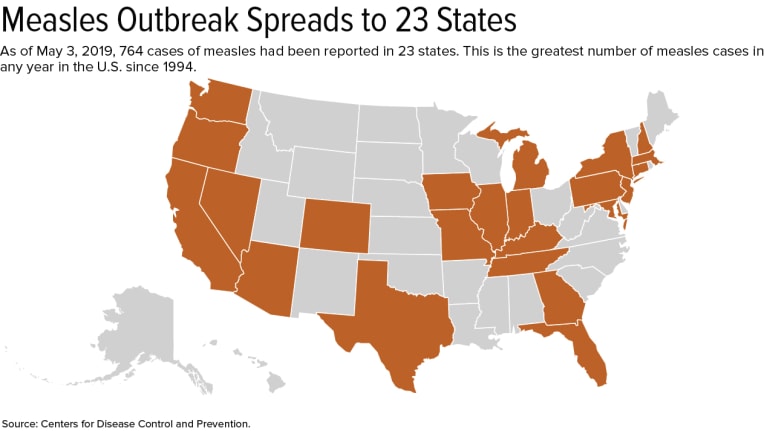What HR can do about the measles — and what it can't
According to the Centers for Disease Control and Prevention (CDC), measles has been confirmed in 26 states since the beginning of 2019, affecting not only schools, medical facilities and public areas, but also the workplace. Continue reading to learn more.
After decades of near-eradication in the U.S., measles is making a comeback. Its return affects not only schools, medical facilities and public areas, but also the workplace.
As of May 24th, there were 535 confirmed cases of measles in Brooklyn and Queens since September, according to the New York City Department of Health and Mental Hygiene. On the other side of the country, the Los Angeles Times recently reported a confirmed case of measles linked to Google's Mountain View campus.
Measles has been confirmed in 26 states since the start of 2019, as of May 24, according to the Centers for Disease Control and Prevention (CDC) — the greatest number of cases reported in the U.S. since 1994; measles was actually declared eliminated in 2000.
Given that measles is "very contagious" and can lead to serious health complications, HR needs to know how to keep employees safe while at the same time remaining in compliance with all applicable health privacy and anti-discrimination laws.
Measles transmission and symptoms
"Measles spreads when a person infected with the measles virus breathes, coughs, or sneezes," said Martha Sharan, Public Affairs Specialist at the CDC, speaking to HR Dive via email. "It is very contagious. You can catch measles just by being in a room where a person with measles has been, up to two hours after that person is gone. And you can catch measles from an infected person even before they have a measles rash."
In addition to a fever that can get high, Sharan said, other possible symptoms include cough, runny nose, and red eyes; a rash of tiny red spots that starts at the head and spreads to the rest of the body; diarrhea; and an ear infection.
Can employers require vaccinations?
In general, requiring employees to get vaccinated is a legally risky proposition for employers; there are some limited exceptions for employers in the healthcare field.
However, many employers — particularly those in the healthcare field — are "starting to be a little more aggressive in terms of asking employees whether they have been vaccinated as the [measles] outbreak continues and in some cases continues to grow," according to attorney Bradford T. Hammock, a shareholder at Littler Mendelson P.C.
"Employers must be very careful about these types of inquiries, but some healthcare employers have made the determination that this is permissible under the [Americans with Disabilities Act] as job-related and consistent with business necessity," Hammock said. He added that employers must also be aware of state and local considerations.
Steve Wojcik, VP of public policy at the National Business Group on Health, said the current concern about measles provides employers with an excellent opportunity to communicate the importance of vaccines and immunizations generally. "Remind employees that the measles vaccine is free, essentially, with no cost-sharing as it is one of the preventive services under the Affordable Care Act. It's a good reminder about preventive services in general."
Wojcik added that employers should encourage employees to check their specific vaccination records to confirm not only that they have received the measles vaccine, but that they have been effectively vaccinated. "Depending on age and when you were vaccinated, some early vaccines may not have been as effective as once thought," he said. Wojcik said that employees born in or before 1956 are assumed to have been exposed to the measles at some point and have some natural immunity, but in the early 1960s, the measles vaccine was "not so good," he said. "It's not as simple as flu or other vaccines."
If your workplace has been exposed
Whatever you do, "be incredibly careful about privacy," said attorney Carolyn D. Richmond, a partner at Fox Rothschild LLP. "Don't go announcing that 'Joe Smith has measles!'" Instead, Richmond advised, "call the local department of health first and find out what they have to say. Every jurisdiction has little tweaks that may affect reporting."
While you can send out a notice to employees stating they may have been exposed to measles, "again, be super careful and don't hint who it might be," she cautioned. "Your local health department will be able to tell you what you can say."
Get your leave policies in order
"Those sick with measles should stay at home for at least four days after developing the rash," said Sharan. "Staying home is an important way to not spread measles to other people. They should talk to their doctor to discuss when it is safe to resume contact with other people."
Wojcik recommended working from home and flexible work arrangements for employees who may have been exposed, particularly those who live in (or have traveled to) areas with known outbreaks. Richmond also suggested providing PTO or work-from-home arrangements for employees who have not been vaccinated or who are immunocompromised.
"We assume that those with measles will absent themselves from the workplace, and an employee with measles may be out for a number of days or longer. Follow your policies and practices with return to work," Richmond told HR Dive in an interview.
Stay in touch with your local health department and the CDC
"Continue to be in contact with your local health department, and follow along with the CDC in terms of guidance," advised Hammock. "Depending on the status of the measles outbreak in your particular area, the analysis may be different."
Richmond concurred. "Contact your local health department and your local counsel — and contact your local health department first. The bottom line is privacy, privacy, privacy."
SOURCE: Carsen, J. (29 May 2019) "What HR can do about the measles — and what it can't" (Web Blog Post). Retrieved from https://www.hrdive.com/news/what-hr-can-do-about-the-measles-and-what-it-cant/555219/
How to Respond to the Spread of Measles in the Workplace
How should employers respond to the spread of measles? With measles now at its highest number of cases in one year since 1994, employers are having to cooperate with health departments to fight the spread. Read this blog post from SHRM to learn more.
Employers and educators are cooperating with health departments to fight the spread of measles, now at its highest number of cases in one year since 1994: 764.
Two California universities—California State University, Los Angeles (Cal State LA) and the University of California, Los Angeles (UCLA)—recently quarantined staff and students at the request of local health departments.
In April at Cal State LA, the health department told more than 600 students and employees to stay home after a student with measles entered a university library.
Also last month, UCLA identified and notified more than 500 students, faculty and staff who may have crossed paths with a student who attended class when contagious. The county health department quarantined 119 students and eight faculty members until their immunity was established.
The quarantines ended April 30 at UCLA and May 2 at Cal State LA.
Measles is one of the most contagious viruses; one measles-infected person can give the virus to 18 others. In fact, 90 percent of unvaccinated people exposed to the virus become infected, the U.S. Centers for Disease Control and Prevention (CDC) notes.
Action Steps for Employers
Once an employer learns someone in the workplace has measles, it should immediately send the worker home and tell him or her not to return until cleared by a physician or other qualified health care provider, said Robin Shea, an attorney with Constangy, Brooks, Smith & Prophete in Winston-Salem, N.C.
The employer should then notify the local health department and follow its recommended actions, said Howard Mavity, an attorney with Fisher Phillips in Atlanta. The company may want to inform workers where and when employees might have been exposed. If employees were possibly exposed, the employer may wish to encourage them to verify vaccination or past-exposure status, directing those who are pregnant or immunocompromised to consult with their physicians, he said.
Do not name the person who has measles, cautioned Katherine Dudley Helms, an attorney with Ogletree Deakins in Columbia, S.C. "Even if it is not a disability—and we cannot assume that, as a general rule, it is not—I believe the ADA [Americans with Disabilities Act] confidentiality provisions cover these medical situations, or there are situations where individuals would be covered by HIPAA [Health Insurance Portability and Accountability Act]."
The employer shouldn't identify the person even if he or she has self-identified as having measles, Mavity noted.
Shea said that once the person is at home, the employer should:
- Inform workers about measles, such as symptoms (e.g., dry cough, inflamed eyes, tiny white spots with bluish-white centers on a red background in the mouth, and a skin rash) and incubation period—usually 10 to 12 days, but sometimes as short as seven days or as long as 21 days, according to the CDC.
- Inform employees about how and where to get vaccinations.
- Remind workers that relatives may have been indirectly exposed.
- Explain that measles exposure to employees who are pregnant or who might be pregnant can be harmful or even fatal to an unborn child.
- Explain that anyone born before 1957 is not at risk. The measles vaccine first became available in 1963, so those who were children before the late 1950s are presumed to have been exposed to measles and be immune.
Employers may also want to bring a health care provider onsite to administer vaccines to employees who want or need them, Shea said.
"Be compassionate to the sick employee by offering FMLA [Family and Medical Leave Act] leave and paid-leave benefit options as applicable," she said.
When a Sick Employee Comes to Work Anyway
What if an employee insists on returning to work despite still having the measles?
Mavity said an employer should inform the worker as soon as it learns he or she has the measles to not return until cleared by a physician, and violating this directive could result in discipline, including discharge. A business nevertheless may be reluctant to discipline someone who is overly conscientious, he said. It may opt instead to send the employee home if he or she returns before being given a medical clearance.
The employer shouldn't make someone stay out longer than is required, Helms said. Rely instead on the health care provider's release.
SOURCE: Smith, A. (9 May 2019) "How to Respond to the Spread of Measles in the Workplace" (Web Blog Post). Retrieved from https://www.shrm.org/resourcesandtools/legal-and-compliance/employment-law/pages/how-to-respond-spread-measles-workplace.aspx



